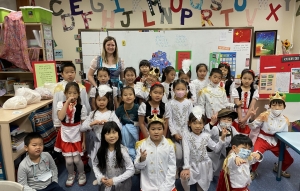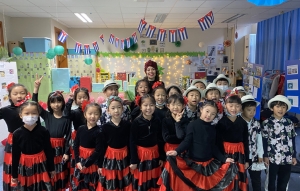Academics
English Curriculum
English Introduction
This course is designed to hone aural and oral skills in English so that students are prepared for the rigors of regular English courses. The course will develop listening, note-taking, study and test-taking skills. Active listening, interactive and presentational oral skills will be another focus of the class.
English Receptive Skills (Grade 9-12)
English 1 (Grade 9)
Students develop essential reading and writing skills through theme-based units exploring diverse literature. They examine fiction and nonfiction texts that connect to real-world issues and human experiences. Through active reading strategies, students analyze how authors use literary devices, text structure, and language to develop themes. They practice close reading to interpret texts, support analysis with evidence, and make personal and societal connections. The course builds strong written communication skills for both academic and real-world applications.
English 2 (Grade 10)
Students build on English 1 foundations by analyzing diverse literary genres through close reading and critical interpretation. They examine how authors use language, structure, and literary techniques to create meaning across poetry, drama, fiction, and nonfiction. Through evidence-based writing and class discussions, students develop sophisticated analytical skills while exploring different cultural perspectives.
English 3 (Grade 11)
By the end of this year-long survey of American literature, students will have studied representative works from colonial writings to modern narratives. Students will develop skills in analytical and argumentative writing, relating to what is read through critical discussions to deepen their understanding of key literary themes. The curriculum will be centered around thematic units, each designed to spark thought-provoking exploration through essential questions.
English 4 (Grade 12)
This course is a year-long exploration of key movements in the British literary tradition, tracing its evolution from the Anglo-Saxon era to the Victorian age, examining universal themes, and historical influences. Students will engage in close reading, critical discussions, and analytical writing, engaging with texts that reflect cultural shifts in perspectives. Emphasis is placed on students building a foundation for college-level literary analysis.





